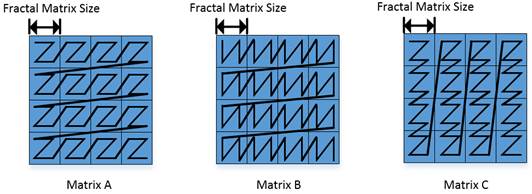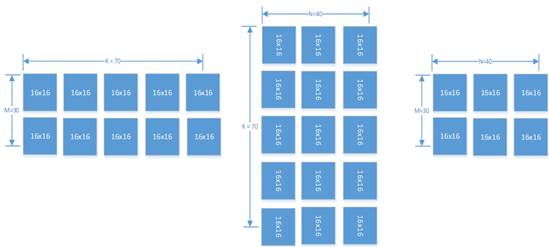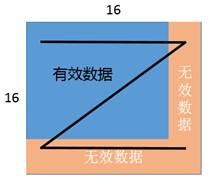Mmad
功能说明
完成矩阵乘加操作。
函数原型
- 不传入biasLocal
1 2
template <typename DstT, typename Src0T, typename Src1T> void Mmad(const LocalTensor<DstT>& dstLocal, const LocalTensor<Src0T>& fmLocal, const LocalTensor<Src1T>& filterLocal, const MmadParams& mmadParams)
- 传入biasLocal
1 2
template <typename DstT, typename Src0T, typename Src1T, typename BiasT> __aicore__ inline void Mmad(const LocalTensor<DstT>& dstLocal, const LocalTensor<Src0T>& fmLocal, const LocalTensor<Src1T>& filterLocal, const LocalTensor<BiasT>& biasLocal, const MmadParams& mmadParams)
参数说明
参数名称 |
输入/输出 |
含义 |
||
|---|---|---|---|---|
dstLocal |
输出 |
目的操作数,结果矩阵,类型为LocalTensor,支持的TPosition为CO1。 LocalTensor的起始地址需要256个元素对齐。 |
||
fmLocal |
输入 |
源操作数,左矩阵a,类型为LocalTensor,支持的TPosition为A2。 LocalTensor的起始地址需要512字节对齐。 |
||
filterLocal |
输入 |
源操作数,右矩阵b,类型为LocalTensor,支持的TPosition为B2。 LocalTensor的起始地址需要512字节对齐。 |
||
biasLocal |
输入 |
源操作数,bias矩阵,类型为LocalTensor,支持的TPosition为C2、CO1。 LocalTensor的起始地址需要128字节对齐。 |
||
mmadParams |
输入 |
矩阵乘相关参数,类型为MmadParams,结构体具体定义为:
参数说明请参考表2。 |
参数名称 |
含义 |
|---|---|
m |
左矩阵Height,取值范围:m∈[0, 4095] 。默认值为0。 |
n |
右矩阵Width,取值范围:n∈[0, 4095] 。默认值为0。 |
k |
左矩阵Width、右矩阵Height,取值范围:k∈[0, 4095] 。默认值为0。 |
fmOffset |
预留参数,用户无需关心,使用默认值0即可。 |
enSsparse |
预留参数,用户无需关心,使用默认值false即可。 |
enWinogradA |
预留参数,用户无需关心,使用默认值false即可。 |
enWinogradB |
预留参数,用户无需关心,使用默认值false即可。 |
unitFlag |
预留参数,用户无需关心,使用默认值0即可。 |
cmatrixInitVal |
配置C矩阵初始值是否为0。默认值true。
|
cmatrixSource |
配置C矩阵初始值是否来源于C2(存放Bias的硬件缓存区)。默认值为false。
Atlas 训练系列产品,仅支持配置为false。 Atlas推理系列产品AI Core,仅支持配置为false。 Atlas A2训练系列产品/Atlas 800I A2推理产品,支持配置为true/false。 Atlas 200/500 A2推理产品, 支持配置为true/false。 注意:带biasLocal输入的接口配置该参数无效,会根据biasLocal输入的位置来判断C矩阵初始值是否来源于CO1还是C2。 |
isBias |
该参数废弃,新开发内容不要使用该参数。如果需要累加初始矩阵,请使用带biasLocal的接口来实现;也可以通过cmatrixInitVal和cmatrixSource参数配置C矩阵的初始值来源来实现。推荐使用带biasLocal的接口,相比于配置cmatrixInitVal和cmatrixSource参数更加简单方便。 配置是否需要累加初始矩阵,默认值为false,取值说明如下:
|
左矩阵fmLocal type |
右矩阵filterLocal type |
结果矩阵dstLocal type |
|---|---|---|
uint8_t |
uint8_t |
uint32_t |
int8_t |
int8_t |
int32_t |
uint8_t |
int8_t |
int32_t |
half |
half |
half 说明:
该精度类型组合,精度无法达到双千分之一,且后续处理器版本不支持该类型转换,建议直接使用half输入float输出。 |
half |
half |
float |
左矩阵fmLocal type |
右矩阵filterLocal type |
结果矩阵dstLocal type |
|---|---|---|
int8_t |
int8_t |
int32_t |
uint8_t |
int8_t |
int32_t |
uint8_t |
uint8_t |
int32_t |
half |
half |
half 说明:
该精度类型组合,精度无法达到双千分之一,且后续处理器版本不支持该类型转换,建议直接使用half输入float输出。 |
half |
half |
float |
左矩阵fmLocal type |
右矩阵filterLocal type |
结果矩阵dstLocal type |
|---|---|---|
int8_t |
int8_t |
int32_t |
half |
half |
float |
float |
float |
float |
bf16 |
bf16 |
float |
int4b_t |
int4b_t |
int32_t |
左矩阵fmLocal type |
右矩阵filterLocal type |
biasLocal type |
结果矩阵dstLocal type |
|---|---|---|---|
int8_t |
int8_t |
int32_t |
int32_t |
half |
half |
float |
float |
float |
float |
float |
float |
bf16 |
bf16 |
float |
float |
注意事项
- dstLocal只支持位于CO1,fmLocal只支持位于A2,filterLocal只支持位于B2。
- 操作数地址偏移对齐要求请参见通用约束。
数据格式说明
Mmad 函数对于输入数据的格式要求和输出数据的要求如下图,矩阵 ABC 分别为 A2/B2/CO1 中的数据。下图中每个小方格代表一个 512Byte 的分形矩阵。下图中Z字形的黑色线条代表对应位置数据在昇腾AI处理器上的排列顺序,起始点是左上角,终点是右下角。
矩阵A:每个分形矩阵内部是行主序,分形矩阵之间是行主序。简称小Z大Z格式。其shape为16 x (32B/sizeof(AType))。
矩阵B:每个分形矩阵内部是列主序,分形矩阵之间是行主序。简称小N大Z格式。其shape为 (32B/sizeof(BType)) x 16。
矩阵C:每个分形矩阵内部是行主序,分形矩阵之间是列主序。简称小Z大N格式。其shape为16 x 16。

以下是一个简单的例子,假设分形矩阵的大小是2x2,然后矩阵ABC的大小都是4x4
0 |
1 |
2 |
3 |
4 |
5 |
6 |
7 |
8 |
9 |
10 |
11 |
12 |
13 |
14 |
15 |
对于一个C风格的矩阵来说内部元素的排列顺序应该是0,1,2…15。
矩阵A的排列顺序:0,1,4,5,2,3,6,7,8,9,12,13,10,11,14,15
矩阵B的排列顺序:0,4,1,5,2,6,3,7,8,12,9,13,10,14,11,15
矩阵C的排列顺序:0,1,4,5,8,9,12,13,2,3,6,7,10,11,14,15
以下是一个具体的例子,数据为half类型。

如图,当 M=30,K=70,N=40 的时候,A2 中应该有 2x5 个 16x16 矩阵,B2 中应该有 5x3 个16x16 矩阵,CO1 中应该有 2x3 个 16x16 矩阵。在这种场景下 M、K 和 N 都不是 16 的倍数,A2 中右下角的矩阵实际有效的数据只有 14x6 个,但是也需要占一个 16x16 矩阵的空间,其他无效数据在计算中会被忽略。
一个 16x16 分形的数据块中,无效数据与有效数据排布的方式示意如下:

支持的型号
调用示例
示例:src1数据类型是half,src2数据类型是half,dst的数据类型是float,mmad不含有矩阵乘偏置。以下样例支持的型号如下:
Atlas 训练系列产品
Atlas推理系列产品AI Core
1 2 3 4 5 6 7 8 9 10 11 12 13 14 15 16 17 18 19 20 21 22 23 24 25 26 27 28 29 30 31 32 33 34 35 36 37 38 39 40 41 42 43 44 45 46 47 48 49 50 51 52 53 54 55 56 57 58 59 60 61 62 63 64 65 66 67 68 69 70 71 72 73 74 75 76 77 78 79 80 81 82 83 84 85 86 87 88 89 90 91 92 93 94 95 96 97 98 99 100 101 102 103 104 105 106 107 108 109 110 111 112 113 114 115 116 117 118 119 120 121 122 123 124 125 126 127 128 129 130 131 132 133 134 135 136 137 138 139 140 141 142 143 144 145 146 147 148 149 150 151 152 153 154 155 156 157 158 159 160 161 162 163 164 165 166 167 168 169 170 171 172 173 174 175 176 177 178 179 180 181 182 183 184 185 | /* * Copyright (c) Huawei Technologies Co., Ltd. 2022-2023. All rights reserved. * * Function : c = a * b (matrix multiplication) * This sample is a very basic sample that implements Matmul on Ascend platform. * In this sample: * Shape of matrix a is [m, k]: [32, 32] * Shape of matrix b is [k, n]: [32, 32] * Shape of matrix c is [m, n]: [32, 32] */ #include "kernel_operator.h" class KernelMatmul { public: __aicore__ inline KernelMatmul() { aSize = m * k; bSize = k * n; cSize = m * n; mBlocks = m / 16; nBlocks = n / 16; kBlocks = k / 16; } __aicore__ inline void Init(GM_ADDR a, GM_ADDR b, GM_ADDR c) { aGM.SetGlobalBuffer((__gm__ half*)a); bGM.SetGlobalBuffer((__gm__ half*)b); cGM.SetGlobalBuffer((__gm__ float*)c); pipe.InitBuffer(inQueueA1, 1, aSize * sizeof(half)); pipe.InitBuffer(inQueueA2, 1, aSize * sizeof(half)); pipe.InitBuffer(inQueueB1, 1, bSize * sizeof(half)); pipe.InitBuffer(inQueueB2, 2, bSize * sizeof(half) / 2); pipe.InitBuffer(outQueueCO1, 2, cSize * sizeof(float) / 2); pipe.InitBuffer(outQueueCO2, 1, cSize * sizeof(float)); } __aicore__ inline void Process() { CopyIn(); SplitA(); AscendC::LocalTensor<half> b1Local = inQueueB1.DeQue<half>(); AscendC::LocalTensor<half> a2Local = inQueueA2.DeQue<half>(); AscendC::LocalTensor<float> c2Local = outQueueCO2.AllocTensor<float>(); // split matrix b into 2 parts, [32, 16] and [32, 16] for (int i = 0; i < 2; ++i) { SplitB(b1Local, i); Compute(a2Local); Aggregate(c2Local, i); } inQueueB1.FreeTensor(b1Local); inQueueA2.FreeTensor(a2Local); outQueueCO2.EnQue<float>(c2Local); CopyOut(); } private: __aicore__ inline void CopyND2NZ(const AscendC::LocalTensor<half>& dst, const AscendC::GlobalTensor<half>& src, const uint16_t height, const uint16_t width) { for (int i = 0; i < width / 16; ++i) { int srcOffset = i * 16; int dstOffset = i * 16 * height; AscendC::DataCopy(dst[dstOffset], src[srcOffset], { height, 1, uint16_t(width / 16 - 1), 0 }); } } __aicore__ inline void CopyIn() { AscendC::LocalTensor<half> a1Local = inQueueA1.AllocTensor<half>(); AscendC::LocalTensor<half> b1Local = inQueueB1.AllocTensor<half>(); AscendC::CopyND2NZ(a1Local, aGM, m, k); AscendC::CopyND2NZ(b1Local, bGM, k, n); inQueueA1.EnQue(a1Local); inQueueB1.EnQue(b1Local); } __aicore__ inline void SplitA() { int srcOffset = 0; int dstOffset = 0; AscendC::LocalTensor<half> a1Local = inQueueA1.DeQue<half>(); AscendC::LocalTensor<half> a2Local = inQueueA2.AllocTensor<half>(); // transform nz to zz for (int i = 0; i < mBlocks; ++i) { AscendC::LoadData2DParams loadDataParams; loadDataParams.repeatTimes = kBlocks; loadDataParams.srcStride = mBlocks; loadDataParams.ifTranspose = false; AscendC::LoadData(a2Local[dstOffset], a1Local[srcOffset], loadDataParams); srcOffset += 16 * 16; dstOffset += k * 16; } inQueueA2.EnQue<half>(a2Local); inQueueA1.FreeTensor(a1Local); } __aicore__ inline void SplitB(const AscendC::LocalTensor<half>& b1Local, const int bSplitIdx) { AscendC::LocalTensor<half> b2Local = inQueueB2.AllocTensor<half>(); // transform nz to zn AscendC::LoadData2DParams loadDataParams; loadDataParams.repeatTimes = kBlocks; loadDataParams.srcStride = 1; loadDataParams.ifTranspose = true; AscendC::LoadData(b2Local, b1Local[bSplitIdx * bSize / 2], loadDataParams); inQueueB2.EnQue<half>(b2Local); } __aicore__ inline void Compute(const AscendC::LocalTensor<half>& a2Local) { AscendC::LocalTensor<half> b2Local = inQueueB2.DeQue<half>(); AscendC::LocalTensor<float> c1Local = outQueueCO1.AllocTensor<float>(); AscendC::Mmad(c1Local, a2Local, b2Local, { m, uint16_t(n / 2), k, 0, false, true }); outQueueCO1.EnQue<float>(c1Local); inQueueB2.FreeTensor(b2Local); } __aicore__ inline void Aggregate(const AscendC::LocalTensor<float>& c2Local, const int bSplitIdx) { AscendC::LocalTensor<float> c1Local = outQueueCO1.DeQue<float>(); AscendC::DataCopyParams dataCopyParams; dataCopyParams.blockCount = 1; dataCopyParams.blockLen = 2; AscendC::DataCopyEnhancedParams enhancedParams; enhancedParams.blockMode = AscendC::BlockMode::BLOCK_MODE_MATRIX; AscendC::DataCopy(c2Local[bSplitIdx * cSize / 2], c1Local, dataCopyParams, enhancedParams); outQueueCO1.FreeTensor(c1Local); } __aicore__ inline void CopyOut() { AscendC::LocalTensor<float> c2Local = outQueueCO2.DeQue<float>(); // transform nz to nd for (int i = 0; i < nBlocks; ++i) { AscendC::DataCopy(cGM[i * 16], c2Local[i * m * 16], { m, 2, 0, uint16_t((nBlocks - 1) * 2) }); } outQueueCO2.FreeTensor(c2Local); } private: AscendC::TPipe pipe; AscendC::TQue<AscendC::QuePosition::A1, 1> inQueueA1; AscendC::TQue<AscendC::QuePosition::A2, 1> inQueueA2; AscendC::TQue<AscendC::QuePosition::B1, 1> inQueueB1; AscendC::TQue<AscendC::QuePosition::B2, 2> inQueueB2; // dst queue AscendC::TQue<AscendC::QuePosition::CO1, 2> outQueueCO1; AscendC::TQue<AscendC::QuePosition::CO2, 1> outQueueCO2; AscendC::GlobalTensor<half> aGM, bGM; AscendC::GlobalTensor<float> cGM; uint16_t m = 32; uint16_t n = 32; uint16_t k = 32; uint16_t aSize, bSize, cSize, mBlocks, nBlocks, kBlocks; }; extern "C" __global__ __aicore__ void matmul_custom(GM_ADDR a, GM_ADDR b, GM_ADDR c) { KernelMatmul op; op.Init(a, b, c); op.Process(); } #ifndef ASCENDC_CPU_DEBUG // call of kernel function void matmul_custom_do(uint32_t blockDim, void* l2ctrl, void* stream, uint8_t* a, uint8_t* b, uint8_t* c) { matmul_custom<<<blockDim, l2ctrl, stream>>>(a, b, c); } #endif |
示例:src1数据类型是half,src2数据类型是half,bias的数据类型是half,dst的数据类型是float,mmad含有矩阵乘偏置。以下样例支持的型号如下:
Atlas A2训练系列产品/Atlas 800I A2推理产品
Atlas 200/500 A2推理产品
1 2 3 4 5 6 7 8 9 10 11 12 13 14 15 16 17 18 19 20 21 22 23 24 25 26 27 28 29 30 31 32 33 34 35 36 37 38 39 40 41 42 43 44 45 46 47 48 49 50 51 52 53 54 55 56 57 58 59 60 61 62 63 64 65 66 67 68 69 70 71 72 73 74 75 76 77 78 79 80 81 82 83 84 85 86 87 88 89 90 91 92 93 94 95 96 97 98 99 100 101 102 103 104 105 106 107 108 109 110 111 112 113 114 115 116 117 118 119 120 121 122 123 124 125 126 127 128 129 130 131 132 133 134 135 136 137 138 139 140 141 142 143 144 | #include "kernel_operator.h" class KernelMatmul { public: __aicore__ inline KernelMatmul() { aSize = m * k; bSize = k * n; cSize = m * n; } __aicore__ inline void Init(__gm__ uint8_t *a, __gm__ uint8_t *b, __gm__ uint8_t *bias, __gm__ uint8_t *c) { aGM.SetGlobalBuffer((__gm__ half *)a); bGM.SetGlobalBuffer((__gm__ half *)b); cGM.SetGlobalBuffer((__gm__ float *)c); biasGM.SetGlobalBuffer((__gm__ half *)bias); pipe.InitBuffer(inQueueA1, 1, aSize * sizeof(half)); pipe.InitBuffer(inQueueA2, 1, aSize * sizeof(half)); pipe.InitBuffer(inQueueB1, 1, bSize * sizeof(half)); pipe.InitBuffer(inQueueB2, 2, bSize * sizeof(half)); pipe.InitBuffer(outQueueCO1, 1, cSize * sizeof(float)); pipe.InitBuffer(inQueueC1, 1, n * sizeof(half)); pipe.InitBuffer(outQueueC2, 1, n * sizeof(float)); } __aicore__ inline void Process() { CopyIn(); SplitA(); SplitB(); SplitBias(); Compute(); CopyOut(); } private: __aicore__ inline void CopyIn() { AscendC::LocalTensor<half> a1Local = inQueueA1.AllocTensor<half>(); AscendC::LocalTensor<half> b1Local = inQueueB1.AllocTensor<half>(); AscendC::LocalTensor<half> bias1Local = inQueueC1.AllocTensor<half>(); AscendC::DataCopy(a1Local, aGM, aSize); AscendC::DataCopy(b1Local, bGM, bSize); AscendC::DataCopy(bias1Local, biasGM, n); inQueueA1.EnQue(a1Local); inQueueB1.EnQue(b1Local); inQueueC1.EnQue(bias1Local); } __aicore__ inline void SplitA() { AscendC::LocalTensor<half> a1Local = inQueueA1.DeQue<half>(); AscendC::LocalTensor<half> a2Local = inQueueA2.AllocTensor<half>(); AscendC::LoadData2DParams loadL0AParams; loadL0AParams.repeatTimes = 1; loadL0AParams.srcStride = 1; AscendC::LoadData(a2Local, a1Local, loadL0AParams); inQueueA2.EnQue<half>(a2Local); inQueueA1.FreeTensor(a1Local); } __aicore__ inline void SplitB() { AscendC::LocalTensor<half> b1Local = inQueueB1.DeQue<half>(); AscendC::LocalTensor<half> b2Local = inQueueB2.AllocTensor<half>(); AscendC::LoadData2DParams loadL0BParams; loadL0BParams.repeatTimes = 1; loadL0BParams.srcStride = 1; loadL0BParams.ifTranspose = true; AscendC::LoadData(b2Local, b1Local, loadL0BParams); inQueueB1.FreeTensor(b1Local); inQueueB2.EnQue<half>(b2Local); } __aicore__ inline void SplitBias() { AscendC::LocalTensor<half> bias1Local = inQueueC1.DeQue<half>(); AscendC::LocalTensor<float> bias2Local = outQueueC2.AllocTensor<float>(); AscendC::DataCopy(bias2Local, bias1Local, { 1, (uint16_t)(n * sizeof(float) / 64), 0, 0 }); outQueueC2.EnQue<float>(bias2Local); inQueueC1.FreeTensor(bias1Local); } __aicore__ inline void Compute() { AscendC::LocalTensor<half> a2Local = inQueueA2.DeQue<half>(); AscendC::LocalTensor<half> b2Local = inQueueB2.DeQue<half>(); AscendC::LocalTensor<float> bias2Local = outQueueC2.DeQue<float>(); AscendC::LocalTensor<float> c1Local = outQueueCO1.AllocTensor<float>(); AscendC::MmadParams mmadParams; mmadParams.m = m; mmadParams.n = n; mmadParams.k = k; mmadParams.cmatrixInitVal = false; AscendC::Mmad(c1Local, a2Local, b2Local, bias2Local, mmadParams); outQueueCO1.EnQue<float>(c1Local); inQueueA2.FreeTensor(a2Local); inQueueB2.FreeTensor(b2Local); outQueueC2.FreeTensor(bias2Local); } __aicore__ inline void CopyOut() { AscendC::LocalTensor<float> c1Local = outQueueCO1.DeQue<float>(); AscendC::FixpipeParamsV220 fixpipeParams; fixpipeParams.nSize = n; fixpipeParams.mSize = m; fixpipeParams.srcStride = m; fixpipeParams.dstStride = n; fixpipeParams.ndNum = 1; fixpipeParams.srcNdStride = 0; fixpipeParams.dstNdStride = 0; AscendC::Fixpipe(cGM, c1Local, fixpipeParams); outQueueCO1.FreeTensor(c1Local); } private: AscendC::TPipe pipe; AscendC::TQue<AscendC::QuePosition::A1, 1> inQueueA1; AscendC::TQue<AscendC::QuePosition::A2, 1> inQueueA2; AscendC::TQue<AscendC::QuePosition::B1, 1> inQueueB1; AscendC::TQue<AscendC::QuePosition::B2, 1> inQueueB2; AscendC::TQue<AscendC::QuePosition::CO1, 1> outQueueCO1; AscendC::TQue<AscendC::QuePosition::C1, 1> inQueueC1; AscendC::TQue<AscendC::QuePosition::C2, 1> outQueueC2; AscendC::GlobalTensor<half> aGM; AscendC::GlobalTensor<half> bGM; AscendC::GlobalTensor<float> cGM; AscendC::GlobalTensor<half> biasGM; uint16_t m = 16, k = 16, n = 16; uint16_t aSize, bSize, cSize; }; extern "C" __global__ __aicore__ void matmul_custom(GM_ADDR a, GM_ADDR b, GM_ADDR bias, GM_ADDR c) { KernelMatmul op; op.Init(a, b, bias, c); op.Process(); } #ifndef ASCENDC_CPU_DEBUG // call of kernel function void matmul_custom_do(uint32_t blockDim, void* l2ctrl, void* stream, uint8_t* a, uint8_t* b, uint8_t* bias, uint8_t* c) { matmul_custom<<<blockDim, l2ctrl, stream>>>(a, b, bias, c); } #endif |